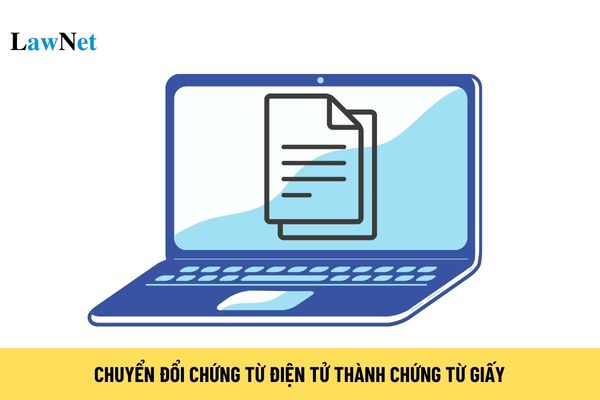Shall paper records converted from e-records be used for transactions in Vietnam?
When should e-records be converted into paper records in Vietnam?
Based on Clause 4 of Article 3 of Decree 123/2020/ND-CP explaining records as materials used to record information about deductible taxes, tax collections, fees, and charges that belong to the state budget as prescribed by tax management law. records as regulated in Decree 123/2020/ND-CP include personal income tax deduction vouchers, tax receipts, fees, and charges presented electronically or printed, self-printed.
e-records include types of personal income tax deduction vouchers, tax receipts, fees, and charges presented in e-form by organizations and individuals responsible for tax deduction to taxpayers or issued by tax, fee, and charge collecting organizations to taxpayers by e-means under fee and charge law, tax law.
According to the provisions of Clause 1, Article 7 of Decree 123/2020/ND-CP, legally e-records can be converted into paper records when economic or financial business requirements arise, or upon request of tax authorities, audit authorities, inspection, investigation, and as per the laws on inspection, examination, and investigation.
The conversion of e-records into paper records must ensure the accuracy between the content of the e-record and the paper record after conversion.
Shall paper records converted from e-records be used for transactions in Vietnam?
According to the provisions of Clause 3, Article 7 of Decree 123/2020/ND-CP on the conversion of e-records into paper records as follows:
Converting e-invoices, e-records into paper invoices, records
...
3. When e-invoices, e-records are converted into paper invoices, records, the paper invoices, records only have value for storage to record, monitor in accordance with accounting law, e-transaction law, not valid for transactions or payments, except in cases where the invoice is generated from a cash register connected to the e-data transfer system with the tax authority under this Decree.
According to the above regulations, when e-records are converted into paper records, the paper records only have the value for storage to record and monitor according to the laws on accounting and e-transactions.
Importantly, they are not effective for transactions or payments, except in cases where an invoice is generated from a cash register connected to the e-data transfer system with the tax authority as stipulated in Decree 123/2020/ND-CP.

Can paper records converted from e-records be used for transactions in Vietnam? (Image from the Internet)
What are regulations on storage and retention of e-records in Vietnam?
According to the provisions of Article 6 of Decree 123/2020/ND-CP on the preservation and storage of invoices and records as follows:
Preservation and storage of invoices and records
1. Invoices and records are stored, retained to ensure:
a) Safety, security, integrity, completeness, and not altered, distorted during the storage period;
b) retained accurately and for the full term as prescribed by accounting law.
2. e-invoices, e-records are retained by e-means. Agencies, organizations, and individuals have the right to choose and apply appropriate forms for the preservation and storage of e-invoices, e-records suitable to their operational characteristics and technology application capacity. e-invoices and records must be ready to be printed or retrievable when required.
3. Invoices printed by tax authorities, printed records, self-printed must be stored and retained properly with the following requirements:
a) Unissued invoices, records are retained in a warehouse according to the storage policy for valuable records.
b) Issued invoices, records in accounting units are retained according to the regulations on the storage and preservation of accounting records.
c) Issued invoices, records in organizations, households, individuals that are not accounting units are retained and stored like the private assets of those organizations, households, or individuals.
e-records are stored and retained by e-means. Agencies, organizations, and individuals have the right to choose and apply appropriate methods for the preservation and storage of e-records suitable to their operational characteristics and technology application capacity.
records must be stored and retained to ensure:
- Safety, security, integrity, completeness, and not altered, distorted during the storage period;
- retained accurately and for the full term according to the provisions of accounting law.
Note: e-records must be ready to be printed or retrievable when required.

